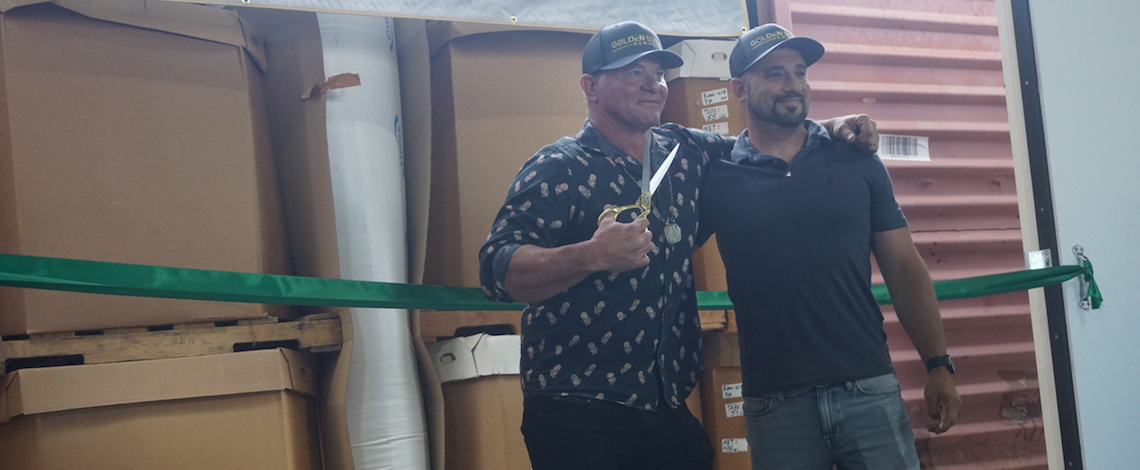
Josh Anderson (left) and Jeff Friedland, co-founders of Other World Management cut the ribbon on 17,000 pounds of industrial hemp they grew with Golden State Hemp. Photo by Edward Smith
Written by Edward Smith
The first shipment of legal hemp to cross state lines in 84 years left Tuesday from Fowler by rail — marking a milestone in deregulation of what some hope will be the plant of 25,000 uses.
Other World Management Inc. and Golden State Hemp shipped 17,000 pounds of industrial hemp via Union Pacific rail to their research lab in Denver, Colorado, according to Jeff Friedland, cofounder of Other World Management.
There, some of the hemp will go toward clinical trials while the rest will go to extraction for CBD products.
Friedland compares the potential for CBD’s medicinal uses to the discovery of blockchain, where the technology is only now beginning to reach its potential.
Seventeen thousand pounds can yield around 377 kilos of CBD oil, depending on the efficiency of the lab and the quality of the plant, said Friedland.
But getting to that point requires coordination of growing sites as well as genetics facilities to create better, more efficient plants. Golden State Hemp has genetics operations in Fresno as well as Wasco. They have divisions in the Midwest and have genetics grown in six states.
Seventeen thousand pounds represents a yield from only three to five acres of the 550 acres Golden State Hemp has across Fresno County.
The Food and Drug Administration has still not approved any CBD treatments in any sort of overarching way. It did approve Epidiolex — a CBD-derived treatment for seizures. It also has so far approved three cannabis-related drug products, according to the FDA’s website.
Following a flood of claims about the usage of CBD to treat a variety of illnesses, the FDA limited how CBD could be marketed.
Friedland says FDA actions show they have a real interest in the medicinal value of CBD.
The focus for Golden State Hemp has been on medicinal uses, but they are also researching uses for hemp fiber.
Friedland says they have a unique process to turn stems and waste into biodegradable plastics.
“It is unique to us, nobody else has this technology,” Friedland said. He said in the next couple years, he hopes to be able to produce biodegradable plastics cheaper than methods using petroleum.
Hemp was removed from being a Schedule I controlled substance in 2018 under the Hemp Farming Act. The federal government classifies it as an ordinary agricultural commodity so long as when it is tested it tests below .3% THC, which is the psychoactive chemical in marijuana.
Friedland calls the limit an “unrealistic” guideline.
The timing of the testing is crucial, Friedland says, because it is very rare hemp tests at the .3% threshold once it is on the shelf. But even the more common 1% THC is far below the 20%-30% recreational marijuana tests at.
Higher percentages allow for more efficiency from crops.
Financing has long been an issue for cannabis companies. Federal law still bans hemp’s cousin, marijuana and companies have to separate their cannabis operations in order to qualify for loans.
While hemp is federally legal, Friedland said he still has not found a bank willing to provide loans for industrial hemp.
The House of Representatives passed on Monday the SAFE Banking Act, which created standards by which banks could not be penalized for providing loans to cannabis companies. The bill is now headed to the Senate.
“For the first time ever it’s the perfect storm where you have legislation trying to go green and you have the consumer demanding more green products,” he said.







